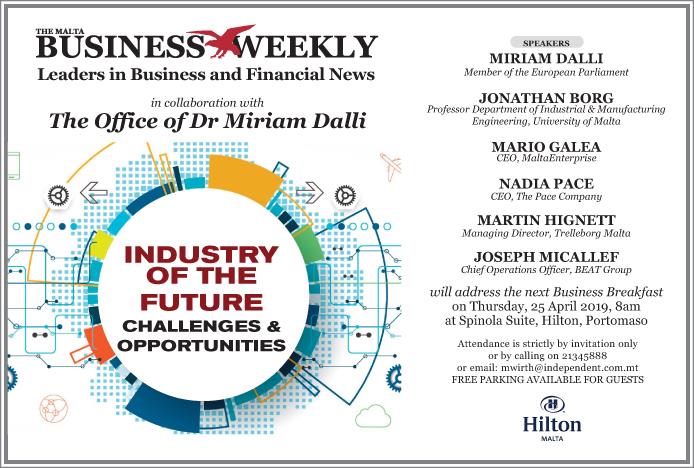There are numerous case-studies that demonstrate that industry is increasingly phasing-in a range of advanced technologies such as 3D Printing, Reverse Engineering, CAD/CAM, Industrial Robotics, Machine Vision, Artificial Intelligence and Augmented Reality to perform a range of activities. The proliferation of such advanced technologies in industry is giving rise to a disruption of how manufacturing organizations design and develop products – it is infact resulting in what is termed as the fourth industrial revolution (Ind4.0).
But what characterizes this fourth industrial revolution? Are there opportunities for those that exploit Ind4.0 concepts and what are the challenges to actually do so? Is such a shift to Ind4.0 something private industry itself should lead and manageon its own or is it something which Government should proactively push and explicitly foster? What should Maltese industry and business leaders proactively do to catch up with other EU and international firms who are getting organized and prepared for this disruption? Does Malta need a holistic industrialpolicy explicitly focusing on managing Industry 4.0? How can our membership of the European Union be exploited to ensure that Malta’s industrial base is adequately andtimely prepared to face the disruption being brought about by Ind4.0? Are there specific skills that our workforce needs to be equipped with and how can these be best acquired? Is our education system adequately prepared towards nurturing workers for this fourth Industrial Revolution and to help others already in employment to catch up?
To be able to understand and react to these open questions, there is a need to first understand what Ind4.0 entails. In a nutshell, Ind4.0 is the term used to the current trend of industrial automation mainly taking place in the manufacturing sector. It includes the exploitation of 3D Printing, Reverse Engineering, CAD/CAM, Industrial Robotics, Machine Vision, Artificial Intelligence, cloud computing, big data, Internet of Things (IOT) and Augmented Reality to perform a number of industrial operations in what is frequently termed as a ‘smart factory’. Through the exploitation of a properly designed combination of such advanced technologies, industrial firms can now be more flexible to customer demands and can be in a better position to provide customized product solutions.Thus changes in unexpected production demands can for example trigger self-organized logistics. Also, in such smart factories, production systems which can predict machine failures and thus automatically trigger maintenance processes. All this may sound simple but in reality, care needs to be taken as it comes along with a number of technical challenges such as the integration ofhardwareand software systems used in different manufacturing systems and provided by different suppliers.

It should be pointed out that the disruption brought about by this fourth industrial revolution is now also being witnessed in sectors beyond manufacturing such as the health sector (Hospital 4.0) and agriculture (Agriculture 4.0). The opportunities and challenges related to the Industry of the Futureare some of the issues being explored during a business breakfast being organized by The Malta Business Weekly, in collaboration with the office of Dr Miriam Dalli, member of the European Parliament. This event will be held on Thursday, 25 April at 8am at Spinola Suite, Hilton, Portomaso. If you would like to learn more about Ind4.0 and would like your opinions to be heard, please register for this business breakfast by calling 2134 5888.
Professor Dr Ing Jonathan C. Borg is a staff member in the Department of Industrial & Manufacturing Engineering at the University of Malta, as we all as director of MECB Ltd, a technical consultancy bureau promoting the exploitation of digital and innovative technologies across Europe.